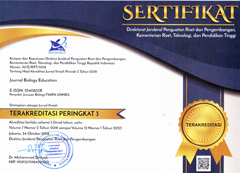The Effectiveness of Discovery Blended Learning through The Ruangkelas Feature on The Ruangguru Application to Improve Student Learning Outcomes on Animal Tissues Material
Abstract
This study use a discovery learning model combined with blended learning through the Ruangkelas feature on the Ruangguru application with question and answer methods, discussions, group work, and experiments. The purpose of this study was to analyze the effectiveness of discovery learning blended learning through the Ruangkelas feature on the Ruangguru application to improve student learning outcomes on animal tissue material. Research preparation was carried out at the Department of Biology FMIPA UNNES while the implementation of the research was carried out at SMA Negeri 1 Petarukan. The sample used in this study was 72 students of class XI MIPA, using probability sampling technique. This research is a quasi-experimental research using pre-experimental design type one group pretest-posttest design. Data collection used interviews, questionnaires, tests, observation, and documentation. The data analysis technique consists of data analysis (1) learning outcomes in the cognitive domain which are determined based on classical completeness and N-gain; (2) affective domain learning outcomes are determined based on attitude criteria; and (3) learning outcomes in the psychomotor domain are determined based on skills. Learning outcomes in the cognitive domain are determined based on tests (pretest and posttest), LDS, and LKS. Affective domain learning outcomes are determined based on self-assessment and peer assessment, while psychomotor learning outcomes are determined based on performance. The results of this study are (1) student learning outcomes in the cognitive domain of class XI MIPA show classical completeness of 83.33% and an N-Gain value of 0.5 in the moderate category; (2) student learning outcomes in the affective domain show 54.17% in very good attitude criteria and 45.83% good attitude criteria; (3) student learning outcomes in the psychomotor domain show 55.56% in very good attitude criteria and 44.44% good attitude criteria. From the results of this study, it is concluded that discovery blended learning through the Ruangkelas feature is effective in improving student learning outcomes.
The copyright of the article once it is accepted for publication shall be assigned to the journal as the publisher. The intended copyright includes the right to publish the article in various forms (including reprints). The journal maintains the publishing rights to the published articles.
This work is licensed under a Creative Commons Attribution 4.0 International License.







